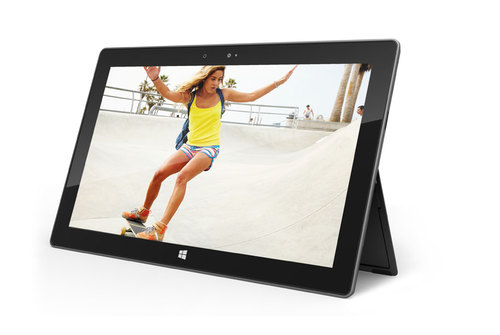If you are Steve Ballmer, going to the mall and walking by an Apple Store loaded with people buying tablets, music players and phones which don’t run his software has to be as pleasurable as preparing for a colonoscopy. He further has to hate the fact this once left-for-dead enterprise not only has a larger market cap than Microsoft, it has helped usher in what many people call the post-PC era. That one’s really gotta hurt.
Even Google is doing hardware
The challenge Apple represents to competitors has upset Google so much they went out and bought a hardware company. Not just any hardware company but one which has had many problems with profitability over the years, Motorola Mobility.
Apple further pushed Microsoft to work more closely with Nokia but Microsoft’s mobile offerings aren’t being received too well by the market. For Ballmer this failure is just another competitive laxative.
What Apple learned from their Motorola experience
If you recall, Apple first marketed a phone in collaboration with Motorola but the phone was difficult to use and didn’t sell. So Apple had to make theirown phone as a result. Likewise, Microsoft sees its hardware partners are getting beaten by Apple. Ultrabooks are great but Apple seems to always be a step ahead. Anyone remember Zune?
Closed Trumps Open
We have seen over the decades that the open Microsoft ecosystem was superior as it allowed robust competition between hardware companies to provide the best price/performance. But in the world of mobile, Nokia and RIM seemed to be successful because they were closed ecosystems – hardware and software working together under the control of a single company.
Apple has carried on this tradition and this is an area where the company has decades of experience. Even mighty Google needs to couple hardware and software together to compete effectively.
Do you have a store?
Perhaps the greatest irony in the world of commerce in the past decade is the need for retail stores to sell consumer electronics products. Remember all those articles written on computers about how the internet would decimate brick and mortar? Well it seems the stores are multiplying – oddly enough to sell computers. Even camera makers think stores will help. Super high-end camera maker Leica is selling its $27,000 cameras through new retail stores – they hope to have hundreds of them worldwide in a few years.
So if camera makers need a store, doesn’t everyone? Apparently so. And this is an area where Google and Microsoft will likely have to invest over the years to compete effectively. But it remains to be seen if anyone can do retail like Apple. Moreover, Microsoft has 20 stores for now – they have a long way to go.
Are these analysts really thinking?
I have heard/read more than a few analysts comment that Microsoft’s new Surface Tablet is not designed to compete with Apple but instead HP and Dell. I can’t really understand how you can design a product and determine who you are competing with. In other words if I am a customer in search of a tablet, wouldn’t I consider all tablets – assuming price and functionality are relatively similar?
This isn’t to say Apple customers will all jump ship onto planet Surface but if Apple screws up or customers think the larger size of the Microsoft product better suits their needs, they will purchase it.
What would make you buy a Microsoft Tablet?
First of all the new Microsoft Surface tablets are larger, have an aspect ratio suitable for HD content and have a cover with a choice of keyboards. I am biased because I input great amounts of text but I can’t live without a keyboard attached to an iPad. Sure I hear all the time about how tablets are “consumption” devices but unless you are just watching video all day, you are going to interact with your device. A keyboard makes this process much simpler.
Beyond that, pricing hasn’t been announced but it is to be similar to netbooks for the Surface Tablet running Windows RT and similar to Ultrabooks for tablets running Windows 8 Pro.
In addition, you there is a microSD slot as well a USB 2.0 port making the device more expendable than iPads.
Then of course there is software. If Office is important to you, you will want this tablet. I use Microsoft Word all the time but haven’t felt the absence of this product on an iPad has been a major problem. Microsoft hopes I am the exception.
So the next question of course will be what programs runs on these tablets and although it is soon to say what current Windows software will run as is, the war is now on to see which platform has the most apps. Of course I have said before, many iOS apps exist simply because Apple’s mobile devices don’t support Flash. This won’t be the case with Microsoft.
Speaking of Flash, it is still hard to believe Apple has been so successful without supporting it. At least once a week I come to a site which is powered by this Adobe solution and have to wait till I get to a PC to view it.
So what about Dell, HP and others?
This move is a vote of no confidence in hardware companies as I have said before. Maybe it will wake them up. The HP Folio (pictured) is ugly. Fell out of the ugly tree, hit every branch on the way down God-awful ugly. It is as if there wasn’t a product design person at the company who could even give input on this thing. And it is supposed to be the driver for Microsoft’s OS business? Yeah, right.
What should be going on in the boardrooms of Dell and HP right now is a corporate decision to stop letting products out the door that look like an engineer designed them.
I was at lunch with a few very successful telecom entrepreneurs today and the discussion got to center around the attention to detail both Amazon and Apple display. One salient comment was that Amazon lets retailers update a new product on their site in two minutes but for eBay the same process takes 30 minutes. We have moved from a world of consumers not caring about design and usability much to one in which these factors are driving massive consumer loyalty. All companies ignore these trends at their own peril.
Would I buy a Surface Tablet?
I want to see one of these units first but if the software is easy to use, there are certainly benefits to using Microsoft devices from a central IT perspective. Then again the virus checking and other security-related software is not only a pain but adds overhead to the device which sucks battery life and tablet speed.
I can say comfortably that no one wants a tablet which is as virus and security-breach prone as today’s Windows desktops and laptops.
This is the ultimate Hail Mary for Microsoft on the desktop
Let’s face it. More users are getting comfortable with Apple and are switching their PCs for a variety of Mac computers. This trend is very scary for Redmond. Microsoft had to make this move and risk alienating their hardware partners. They also had to do it now. They may even be too late. I have seen so many technology demonstrations from this company over the years which haven’t turned into products because Redmond had to rely on others. Now they have the chance to put hardware and software together and give us a superior experience. Apple has raised the bar high – skyscraper high. Microsoft has a shot to impress the world with its new achievement. For their sake, they better have most of the details and kinks worked out. Otherwise, their mobile destiny may be very similar to that of Palm, Nokia and RIM.







